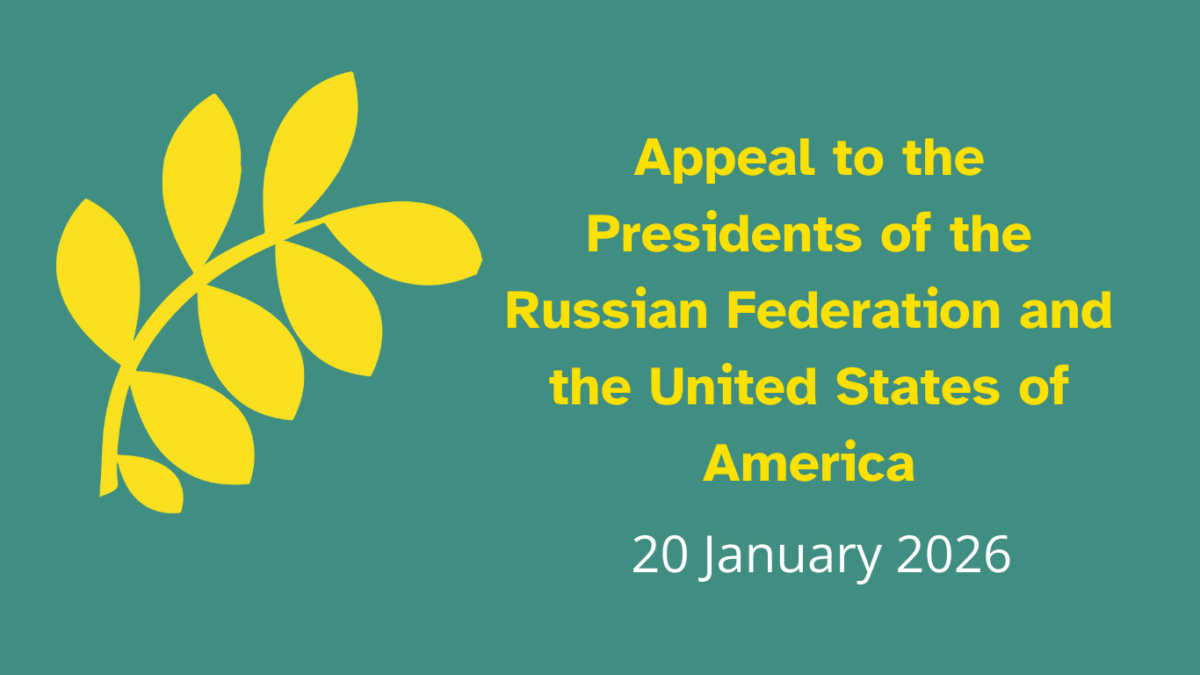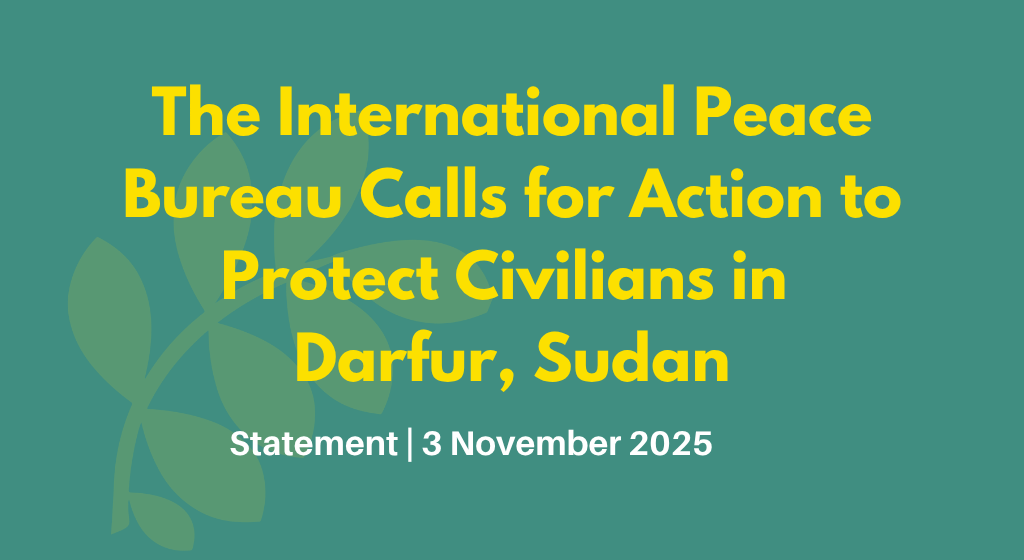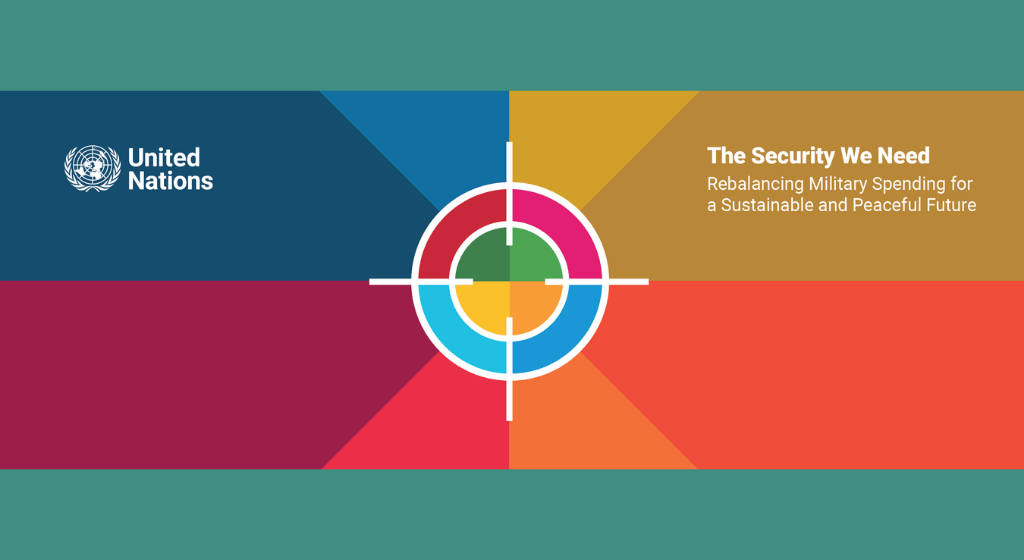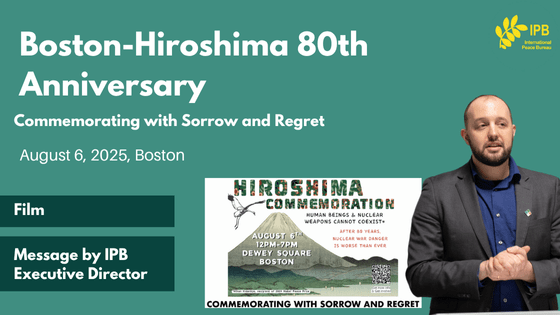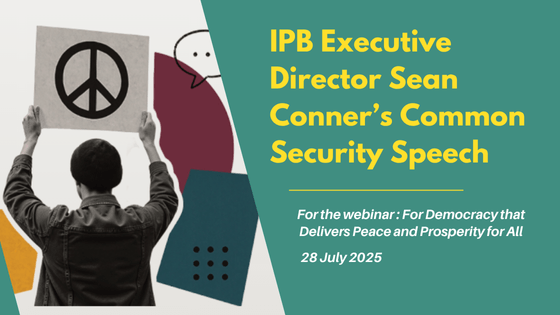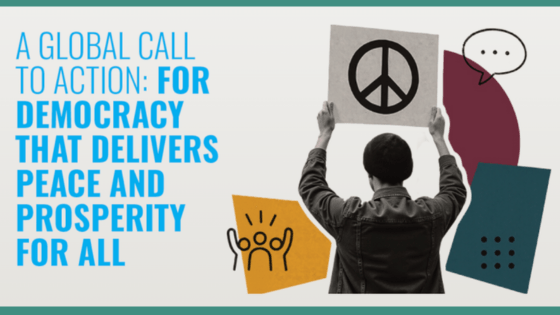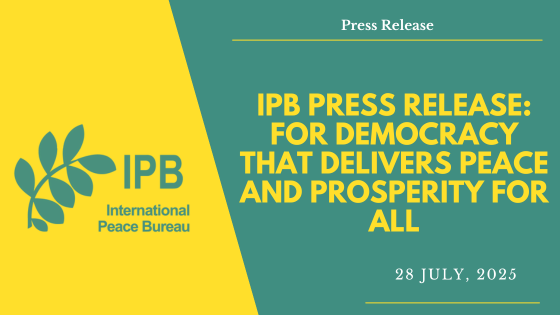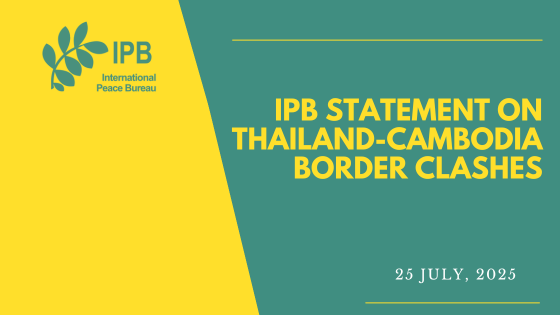On 5 February 2026, the last nuclear arms control treaty between the USA and Russian Federation, The United States of America and the Russian Federation on Measures for the Further Reduction and Limitation of Strategic Offensive Arms (New START), which has limited the nuclear arms race – albeit completely inadequately – will expire. There is a danger of an unrestrained arms race, including a nuclear arms race, with far-reaching political, strategic, economic and psychological consequences, leading to even greater confrontation and destabilisation of the already volatile international situation.
Continue reading “Appeal to the Presidents of the Russian Federation and the United States of America”Tag: disarmament
The International Peace Bureau Calls for Action to Protect Civilians in Darfur, Sudan
El Fashir, the last standing city in Darfur, Sudan, has fallen to the Rapid Support Forces (RSF). And civilians are facing mass humanitarian atrocities.
For more than 550 days, the city had been under siege, devastated by the systematic cut off of aid, food, and medicine. Thousands were killed through execution, bombardment, starvation & severe malnutrition. In two days, more than two thousand people have been killed. 460 patients and their families were massacred inside the Saudi Maternity Hospital, medical staff were abducted, and an estimated 180,000 people remain trapped inside with no safe passage out. While the Rapid Support Forces broadcast videos of their own crimes, parading victims, and committing documented executions. The world’s response to these atrocities has been shameful.
IPB Co-President Joseph Gerson stated:
“In pursuit of arms sales profits and Sudan’s resources, cynical forces have made medieval brutality possible. It must stop, and the people of Darfur must be permitted to rebuild their lives and futures without fear.”
The International Peace Bureau does not accept the status quo of brutal violence, mass murder, and dominance, and we stand with the people of Sudan. We recognise that the first, fastest responders are the local networks of volunteer medics, community kitchens, and emergency response rooms, who continue to provide lifesaving assistance despite the collapse of state protection. Supporting these actors is central to saving lives and affirming human dignity during this systemic and unacceptable violence.
The International Peace Bureau calls on citizens, media, and governments alike to keep Sudan and their work visible, to challenge indifference, and to sustain public pressure for a cease-fire and opening of unrestricted humanitarian corridors to all affected areas in Darfur.
The Security We Need: Rebalancing Military Spending for a Sustainable and Peaceful Future
9 September 2025, New York – Following a decade-long military build-up, global military spending hit a record high in 2024, soaring by more than nine per cent from 2023 and signaling a dangerous move away from the principles of the UN Charter.
Amid an era of geopolitical tension and distrust fueling unprecedented death and destruction around the world, the UN Secretary-General’s report, The Security We Need: Rebalancing Military Spending for a Sustainable and Peaceful Future, urges UN Member States to recalibrate security and development priorities.
Boston-Hiroshima 80th Anniversary
6 August 2025, Boston – To mark the 80th anniversary of the Hiroshima atomic bombing, the Boston-Hiroshima 80th Anniversary Commemoration Coalition produced a 70-minute video, shown repeatedly during today’s event. The film is divided into three parts, exploring:
- The significance of August 6, 1945
- The legacy of the Hibakusha — survivors of Hiroshima and Nagasaki
- A call for nuclear disarmament
The coalition also organized a gathering at Dewey Square, across from South Station in downtown Boston. On this occasion, IPB Executive Director Sean Conner delivered a message to the people of Boston and fellow citizens across the United States. You can read his full speech below.
IPB Executive Director’s Speech at Boston-Hiroshima 80th Anniversary
Many US Americans my age and younger may not be aware of the true dangers of nuclear war in the modern era. There is a common misperception that the risk of nuclear war drastically decreased after the end of the Cold War when in fact the current situation is as dangerous, if not more.
Nearly all nuclear-armed states are undergoing intensive nuclear modernization programs and the total number of nuclear warheads is on the rise. According to the Stockholm International Peace Research institute, the total number of warheads in 2024 was estimated to be 12,241, with 2,100 in a state of high operational alert on ballistic missiles. Nuclear arms control is all but abandoned – the last remaining nuclear limitations agreement by the US and Russia, the New START Treaty, is set to expire in February 2026. Nuclear threats and talk of proliferation – including the deployment of Russian nuclear missiles in Belarus and the return of US nuclear missiles to the UK – are on the rise. New so-called ‘tactical’ nuclear weapons increase the risk of their usage.
Make no mistake – nuclear deterrence theory is based fundamentally on a lie. There have been several close calls over the decades – from the Cuban Missile Crisis to the 2018 false missile alert in Hawaii. On each of these occasions, it is only by pure luck that we have not seen catastrophe. Whether purposeful or accidental, any use of nuclear weapons will likely cause a chain of events in which more weapons will be used. Even if a mere fraction of nuclear weapons are used – including in a regional conflict – the consequences will be global.
Nuclear weapons are by nature indiscriminate – there is no distinction between military and civilian, or environment for that matter. And the consequences are long-term and widespread.
80 years after the Atomic Bombings of Hiroshima and Nagasaki, we would be wise to learn the lessons that the Hibakusha, the survivors, share. We must abolish nuclear weapons and strengthen peaceful conflict resolution mechanisms. The good news is that there is already a framework – the Treaty on the Prohibition of Nuclear Weapons. Join us in demanding that the US and all countries sign and ratify now!
IPB Executive Director Sean Conner’s Common Security Speech
IPB Executive Director Sean Conner’s Common Security Speech in the International Trade Union’s July 28 webinar For Democracy that Delivers Peace and Prosperity for All.
The basic idea behind Common Security is that the security of one is inextricably linked to the security of all; that the security of a state, nation, or peoples cannot be achieved at the expense of the security of another; that security is not a zero-sum game.
Continue reading “IPB Executive Director Sean Conner’s Common Security Speech”Unyielding Grace: Shirine Jurdi and the Feminine Force for Justice
This episode brings you a powerful and unflinching conversation with Shirine Jurdi, a global advocate for women, peace, and security from Lebanon. Prepare to challenge your perspectives as Shirine dismantles the narratives often imposed on women in conflict zones, offering a raw and honest look at the realities of war, justice, and the fight for a life of dignity, not just survival.
Continue reading “Unyielding Grace: Shirine Jurdi and the Feminine Force for Justice”A GLOBAL CALL TO ACTION: FOR DEMOCRACY THAT DELIVERS PEACE AND PROSPERITY FOR ALL
FOR DEMOCRACY THAT DELIVERS PEACE AND PROSPERITY FOR ALL
As we approach the 80th anniversary of the atomic bombings of Hiroshima and Nagasaki, we, the undersigned organisations, call on governments and international institutions to reaffirm their commitment to a world free from nuclear weapons, honouring the demand of the Hibakusha and 2024 Nobel Peace laureate Nihon Hidankyo, and to prioritize sustainable development over militarism, people of collective power, accelerating military build-up and climate change, and diverting resources away from human development and peacebuilding.
As organisations from the peace, labour, economic justice, and climate movements, we share the belief that collective security can only be ensured through solidarity, by meeting the basic needs of all people.
Continue reading “A GLOBAL CALL TO ACTION: FOR DEMOCRACY THAT DELIVERS PEACE AND PROSPERITY FOR ALL”IPB Press Release: For Democracy that Delivers Peace and Prosperity for All
27 July 2025, Berlin, Germany
The International Peace Bureau (IPB), in cooperation with the International Trade Union Confederation (ITUC), Greenpeace, the International Campaign to Abolish Nuclear Weapons, Oxfam, and 350.org, has released a global call to action for nuclear and conventional disarmament, common security, and a prioritization of sustainable development over militarism.
Continue reading “IPB Press Release: For Democracy that Delivers Peace and Prosperity for All”IPB Statement on Thailand-Cambodia Border Clashes
25 July 2025
The International Peace Bureau (IPB) expresses deep concern over the rising military clashes and political tensions between Thailand and Cambodia, which have resulted in the death of at least 15 civilians and the mass displacement of civilians from border areas. The escalation of long-standing tensions over the border risks further exacerbating civilian suffering and displacement.
The IPB calls for an immediate ceasefire and a return to diplomatic negotiations and conflict resolution as the only tools that can solve the crisis. Nationalist and militaristic rhetoric must be replaced by dialogue and common security. Moreover, IPB calls on ASEAN, particularly neighbour states, in the region and those with military ties to either party to encourage de-escalation and peaceful resolution.
You are currently viewing a placeholder content from Default. To access the actual content, click the button below. Please note that doing so will share data with third-party providers.
More Information Loading…
Loading…
Neutrality Colloquium: A Call to Action for Active Neutrality & World Peace
Neutrality Colloquium: A Call to Action for Active Neutrality & World Peace
Geneva, Switzerland | June 26-27, 2025
The Neutrality Colloquium took place on June 26–27, 2025, in Geneva, Switzerland, bringing together 90 experts in diplomacy, international law, peacebuilding, and digitalization, from 27 countries across five continents—including Colombia, Argentina, Costa Rica, the USA, the DRC, Syria, Moldova, Ireland, Japan, and China. Held in hybrid format, the Colloquium served as a critical platform to explore and promote active neutrality as a strategy for peacebuilding, conflict prevention, and global stability amid growing geopolitical tensions, rising militarization, and ongoing humanitarian crises.
This gathering followed the First International Congress on Neutrality, which was held in Bogotá, Colombia, in April 2024. That congress marked a milestone, with participants from 25 countries laying the groundwork for a renewed global conversation on neutrality. The Geneva Colloquium was conceived as a smaller, expert-level forum to build upon that momentum and shape the vision for the Second International Congress on Neutrality, scheduled for 2026.
The event was jointly organized by a coalition of organizations committed to peace and disarmament: Global Veterans Peace Network (GVPN), World BEYOND War, Inter-University Network for Peace (REDIPAZ), International Peace Bureau (IPB), Transnational Institute, the Colombia Peace Agreement, and the Geneva Center for Neutrality, which hosted the gathering. Their collaboration was essential to the success of the Colloquium.
Over two days, participants engaged in five thematic focus groups:
- Current Neutrality Practices
- Digital Neutrality in the Age of Cyberwarfare and AI
- Neutrality and Media
- Building a New Non-Aligned Movement
- Neutrality and Common Security in a Militarized World
Each group developed specific recommendations, which were integrated into the final outcomes of the Colloquium: a Modern Neutrality Final Declaration and an Action Agenda to Promote Active Neutrality.
The Declaration stresses that neutrality is not indifference. Rather, it is a strategic, principled approach to international relations—one that prioritizes peace over power projection, sovereignty over dominance, and cooperation over confrontation. In light of the alarming rise in military expenditures—including NATO’s recent commitment to allocate up to 5% of GDP to defense—the declaration calls for redirecting resources from warfare to social, ecological, and economic justice.
“Active neutrality is neither passive nor indifferent. It is a proactive, values-based stance, rooted in non-alignment, non-intervention, and demilitarization. In a context of rising geopolitical rivalries, climate breakdown, and digital warfare, active neutrality means to:
- Prioritize peace over power projection
- Promote sovereignty and self-determination, especially for the Global South
- Reject participation in arms races, military alliances or military interventions
- Promote dialogue, diplomacy and multilateralism
- Invest in social, ecological and economic justice instead of war”
The Geneva Colloquium marked a significant step in global efforts to redefine and reinvigorate the role of neutrality in the 21st century. The inputs and outcomes of this event will directly inform the Second International Congress on Neutrality in 2026—ensuring that the principles of active neutrality continue to evolve as powerful tools for peace and justice in our increasingly polarized world.
You can read and download the documents below:
- Modern Neutrality Final Declaration
- Action Agenda to Promote Active Neutrality
- Press Release: Colloquium on Neutrality by Geneva Center for Neutrality Official
- Modern Neutrality Final Declaration
- Action Agenda to Promote Active Neutrality
- Press Release: Colloquium on Neutrality by Geneva Center for Neutrality

